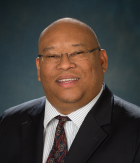Andre Palmer
The Ohio State University
Department Chair
Department of Chemical and Biomolecular Engineering
Wednesday October 16, 2019
+Amol Ajinkya Memorial Fund Lecture
Engineering oxygen therapeutics for use in transfusion medicine
Universal oxygen (O2) carrying solutions that can replace the O2 storage and transport functions of red blood cells (RBCs) will greatly improve clinical outcomes for trauma victims and patients undergoing high-blood-loss surgical procedures. These O2 carriers are to be used when blood is not readily available, such as on the battlefield, during natural disasters, at the site of a terrorist attack or in rural areas without hospital access. My talk will address a simple approach for designing hemoglobin-based O2 carriers (HBOCs) as RBC substitutes. Our design strategy is based on the observation that transfusion of cell-free hemoglobin results in vasoconstriction, systemic hypertension and oxidative tissue injury. The root cause of these side-effects stem from the ability of hemoglobin to extravasate through pores lining the wall of blood vessels, and consequently scavenge nitric oxide from the surrounding vasculature as well as catalyze production of reactive oxygen species. Therefore, our design strategy will focus on increasing the molecular diameter of HBOCs so that they are unable to traverse across the wall of blood vessels into the tissue space to limit/prevent these side-effects. In this talk, I will discuss the design, biophysical properties and in vivo response of polymerized hemoglobin (a class of HBOC). This work is significant in that it will lead to the development of novel materials that are safe and efficacious for use in transfusion medicine.
Bio
Professor Palmer’s research interests encompass the development of novel hemoglobin-based oxygen carriers for a variety of applications in transfusion medicine and tissue engineering. His lab is also developing non-heme based plasma substitutes, red blood cell storage solutions and monocyte/macrophage targeted drug delivery systems. He is author of more than 100 peer reviewed publications. Among others, he received the National Science Foundation Career Award, and the Harrison Faculty Award for Excellence in Engineering Education from The Ohio State University College of Engineering. Prof. Palmer currently serves on the International Scientific Advisory Committee on Blood Substitutes, and is a member of the Bioengineering, Technology, and Surgical Sciences Study Section at the National Institutes of Health. In 2015, he was inducted into the College of Fellows of the American Institute for Medical and Biological Engineering. Palmer’s research is supported by grants from the National Institutes of Health and the Department of Defense.
Wednesday October 16, 2019
- Time: 11.00 AM
- Location: 206 Furnas Hall
- Seminar Flyer

Andre Palmer
Professor
The Ohio State University